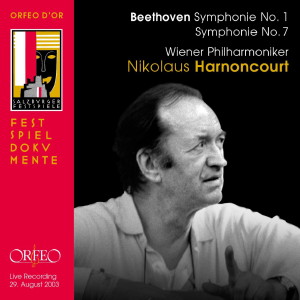 |
1 CD -
C 924 161 B - (p) (c) 2016
|
|
| Ludwig van
Beethoven (1770-1827) |
|
|
|
|
|
| Symphonie No. 1 C-Dur op.
21 |
26' 50" |
|
| - Adagio molto - Allegro
con brio |
9' 28" |
|
- Andante cantabile con
moto
|
7' 22" |
|
| - Menuetto: Allegro
molto e vivace |
3' 54" |
|
- Finale: Adagio -
Allegro molto e vivace
|
6' 06" |
|
|
|
|
| Symphonie No. 7 A-Dur
op.92 |
39' 50" |
|
- Poco sostenuto -
Vivace
|
12' 20" |
|
- Allegretto
|
8' 42" |
|
- Presto - assai meno
presto
|
9' 32" |
|
- Allegro con brio
|
9' 14" |
|
|
|
|
| WIENER
PHILHARMONIKER |
|
| Nikolaus
Harnoncourt |
|
|
Luogo e data
di registrazione
|
| Felsenreitschule, Salisburgo
(Austria) - 29 agosto 2003 |
|
Registrazione
live / studio
|
live - Salzburger Festspiele
(5. Orchesterkonzert)
|
Producer / Engineer
|
Gottfried Kraus
|
Prima Edizione
CD
|
Orfeo "Orfeo d'Or" - C 924 161
B - (1 cd) - 69' 46" - (p) (c) 2016 -
DDD
|
|
Prima
Edizione LP
|
-
|
|
|
Notes
|
Commemorating
a torchbearer
"The day
will come, we know not when"
- of course, we all knew that
even his reign oould
not last
forever.
But I, like
so many others, nevertheless
hoped that Nikolaus
Harnoncourt would celebrate
his hunderedth
birthday with a musical
treat for us
and, indeed, for himself.
When he conducted a
performance of
Beethoven's Missa
solemnis last
summer, there was no way
of knowing that this
would bring the Salzburg
Festival full circle,
completing a cycle that
began with a performance
of that very work during
Nikolaus Harnoncourt's
debut at the Salzburg
Festival back in 1992.
Then as today, the
performance was
uncompromising, rousing
and overwhelming. The
news of his death on
March 5, 2016, was met
with profound sadness
and grief throughout the
music world, and it
remains for us to
remember with utmost
gratitude all those
highlights, truly
unprecedented moments,
that he gave to our
festival throughout
nearly a
quarter-century.
I
first met Nikolaus
Harnoncourt in
Salzburg in 1982. The
director at the time,
Frederik Mirdita, had
staged a brilliant
performance of Henry
Purcell's Dido and
Aeneas at the
Salzburg
Landestheater. I was
immediately gripped by
Harnoncourt's fiery
enthusiasm. From then
on I was part of the
"happy community of
discoverers" (to quote
Nikolaus Harnoncourt),
a union that he
justifiably cherished.
Harnoncourt's
career in Salzburg
began on the other
side of the River
Salzach. From 1972 he
taught performance
practice and organology
as a professor at The
Mozarteum in Salzburg.
It
was during Mozart Week
in 1980
that he first
conducted a major
orchestra in Austria,
namely the
Concertgebouw
Orchestra of Amsterdam.
The International
Mozarteum
Foundation was again
responsible for his
debut with the Vienna
Philharmonic. After
all, Herbert von
Karajan did not want
Hornoncourt to
appear at the
festival during his
lifetime. Karajan and
Harnoncourt stood at the
poles of contrasting
musical worlds.
Howeyer, they did have
one thing in common:
both looked to bring
out the truth in
music; both remained
seekers throughout
their
lives, but their
searches took
radically different
paths.
1992 finally saw
Nikolaus Harnoncourt
step onto the
podium at the
Salzburg Festival for
the first time. This
was followed by
outstanding concert
highlights - including
a complete Beethoven
cycle -
and unforgettable
opera productions,
such as L'incoronazione
di Poppea,
two
productions of
Mozart's Le nozze
di Figaro as
well as Don
Giovanni and La
clemenza
di Tito. He
always succeeded in fathoming
out unknown elements
within the
supposedly familiar
whilst allowing the
seemingly wellknown to
appear in a completely
new light and uniting
his listeners as a
community of
discoyerers.
"The
opening concert
featuring Monteverdi's
L'incoronozione di
Poppea turned
out to be a personal triumph
for conductor Nikolaus
Harnoncourt," wrote
Gerhard Rohde in the
Frankfurter Allgemeine
Zeitung of July 26,
1993.
Harnoncourt had many
personal triumphs, yet
this
term strikes a false
note. He was not out
for personal triumph.
His mission was art
and truth.
This is what made Nikolaus
Harnoncourt so
inspiring, so unique.
"Art is a language
that reveals hidden
treasure, tears open
the seals and makes
the innermost keenly
felt. It exhorts,
recounts, moves and
delights... Beauty in
art includes
opposites, its name is
truth and it can be
oppressive,"
postulated Harnoncourt
in his keynote address
opening the 1995
Salzburg Festival. It
was a remarkable
speech in which he
showed no reluctance
to point out
unpleasant truths
and admonish artists
and audiences to
be mindful of their
respansibility.
Nikolaus Harnoncourt,
that passionate torchbearer,
will be missed. We
miss him already.
Helga
Rabl-Stadler
President
of the Salzburg
Festival
|
|
Nikolaus
Harnoncourt (1929-2016)
|

|

|
|